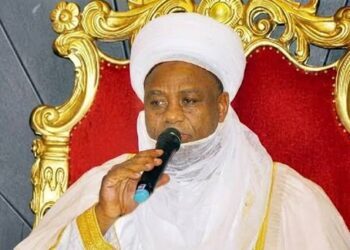The Socio-Economic Rights and Accountability Project (SERAP) has filed a lawsuit against the Senate President, Mr Godswill Akpabio over “the failure to reverse the patently unlawful suspension of Senator Natasha Akpoti-Uduaghan, as the purported suspension is based solely on the peaceful exercise of her right to freedom of expression.”
Mr Akpabio is sued for himself and on behalf of all members of the Senate.
The Senate recently suspended Mrs Akpoti-Uduaghan for six months, after she reportedly ‘spoke without permission’ and ‘refused her new seat in the Senate chamber.’
Her salary and allowances have also been withheld for the duration of the suspension, and she has been barred from identifying herself as a senator.
In the suit numbered FHC/ABJ/CS/498/2025, filed last Friday at the Federal High Court, Abuja, SERAP is seeking: “an order of mandamus to direct and compel Mr Akpabio to rescind the unlawful suspension of Mrs Natasha Akpoti-Uduaghan, reinstate her, and fully restore all her legislative rights, entitlements, and privileges.”
SERAP is seeking “an order of perpetual injunction restraining the Senate from further suspending or taking any disciplinary action against Mrs Natasha Akpoti-Uduaghan solely for the peaceful exercise of her fundamental human rights.”
It is also seeking “a declaration that the application of sections 6(1)(2) of the Senate Rules, the Senate Standing Orders 2023 (as amended), to suspend Mrs Natasha Akpoti-Uduaghan violates her human rights and deprives her constituents of their right to political participation.”
In the suit, SERAP argues that “granting this application would serve the public interest and promote respect for the rights of everyone in the National Assembly.”
It said, “No one should ever be punished for ‘speaking without permission’. Being a senator does not deprive Mrs Akpoti-Uduaghan of her fundamental human rights. The Senate should be setting an example by upholding the rule of law and promoting and protecting human rights, not stamping them out.
“Punishing Mrs Akpoti-Uduaghan solely for peacefully expressing herself is unlawful, unnecessary and disproportionate. Her suspension would also have a disproportionate chilling effect on the ability of other members of the Senate to freely express themselves and exercise their human rights.
“Mrs Akpoti-Uduaghan’s suspension is based solely on the peaceful exercise of her right to freedom of expression in the Senate. All the other grounds cited by the Senate for her suspension seem to be a pretext to further restrict her fundamental human rights.”
The suit filed on behalf of SERAP by its lawyers, Kolawole Oluwadare and Mrs Adelanke Aremo, read in part: “No member of the Senate should suffer any consequences for peacefully exercising their freedom of expression.”
The organisation said the suspension of Senator Akpoti-Uduaghan from the Senate has “restricted and seriously undermined the ability of the residents of her Kogi Central Senatorial District to effectively participate in their own government”.
It said, “The Declaration of Principles on Freedom of Expression in Africa, in Principle II (2) provides that ‘any restrictions on freedom of expression shall be provided for by law, serve a legitimate interest and be necessary and in a democratic society’.
“Article 13 of the African Charter on Human and Peoples’ Rights provides that, ‘Every citizen shall have the right to participate freely in the government of his country, either directly or through freely chosen representatives in accordance with the provisions of the law.’
“The right to express one’s opinion is of paramount importance, not only because it oils the engine of a representative democracy but also because it creates a free and open environment.
“The right to freedom of expression is a fundamental individual human right which is also a cornerstone of democracy and a means of ensuring the respect for all human rights and freedoms.
“The Human Rights Council, the body charged with monitoring implementation of the International Covenant on Civil and Political Rights has stressed that any limitations or restrictions to freedom of expression should be applied strictly so that they do ‘not put in jeopardy the right itself.’
“Article 19(1) of the Covenant establishes the right to freedom of opinion without interference. Article 19(2) establishes the Senate’s obligations to respect and ensure ‘the right to freedom of expression,’ which includes the freedom to seek, receive and impart information and ideas of all kinds, either orally or in writing.
“The Senate Standing Orders 2023 (as amended) should not and cannot set aside Mrs Akpoti-Uduaghan’s right to express herself and disseminate her opinions which is clearly guaranteed in section 39 of the Nigerian Constitution 1999 [as amended], and under the human rights treaties to which Nigeria is a state party.”
No date has been fixed for the hearing of the suit.










